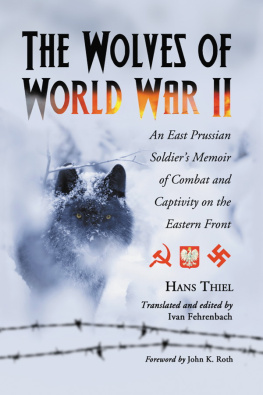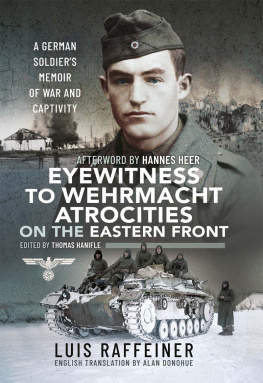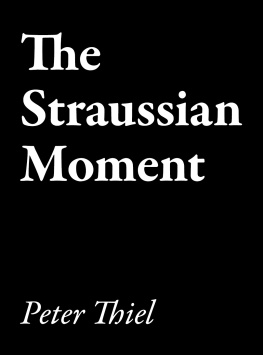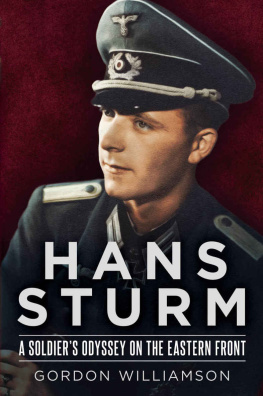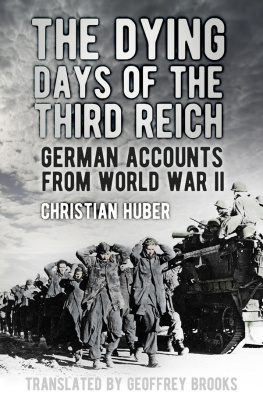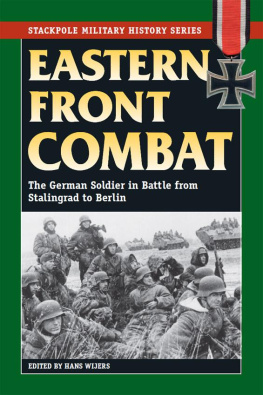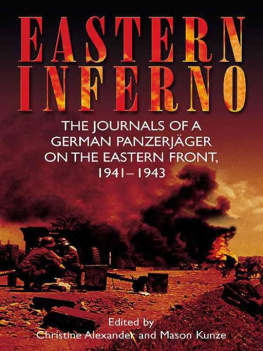
Table of Contents
LIBRARY OF CONGRESS CATALOGUING-IN-PUBLICATION DATA
Thiel, Hans, 19021974.
The wolves of World War II: an East Prussian soldiers memoir of combat and captivity on the Eastern Front / Hans Thiel ; translated and edited by Ivan Fehrenbach ; foreword by John K. Roth.
p. cm.
Includes bibliographical references and index.
ISBN-13: 978-0-7864-2971-4
1. Thiel, Hans, 19021974. 2. Thiel, Hans, 19021974Imprisonment. 3. World War, 19391945GermanyBiography. 4. World War, 19391945CampaignsEastern Front. 5. World War, 19391945Personal narratives, German. 6. SoldiersGermanyBiography. 7. Prisoners of warGermanyBiography. 8. Prisoners of warRussiaBiography. 9. Prisoners of warPolandBiography. 10. GermanyPolitics and government19331945. 11. Totalitarianism. I. Fehrenbach, Ivan, 1978 II. Title.
D757.3.T485A3 2007
940.54'7247092dc22 2006102716
British Library cataloguing data are available
2007 Martin Thiel and Ivan Fehrenbach. All rights reserved
No part of this book may be reproduced or transmitted in any form or by any means, electronic or mechanical, including photocopying or recording, or by any information storage and retrieval system, without permission in writing from the publisher.
On the cover: Wolves 2007 Design Pics; fire and barbwire 2007 PhotoSpin; hammer and sickle, Polish heraldic shield and swastika vexilla-mundi.com
McFarland & Company, Inc., Publishers
Box 611, Jefferson, North Carolina 28640
www.mcfarlandpub.com
To Captain Gus,
tan old German and great father
Acknowledgments
The research required to bring Hans Thiels manuscript to its current state was truly a collaborative effort, and a number of people should be thanked for their assistance in the project. I am grateful to Ronald Bachman in the Library of Congress; to Peter Dembowski and Katarzyna Litynska for answering questions about the Polish and Russian languages; to David B. Morris in the Library of Congress; to Carol Poore, Elsa Diduk, and Hanni Sherman for answering questions about the German language and German-related issues; to Cynthia Smith in the Library of Congress for her assistance with the maps; to Dr. Robert Hardi for answering medical questions; and also to Alan Burke, Andy Franck, Trotter Hardy, Katie Hayes, John K. Roth, Martin E. Silfen, Peter Van Bergen, Arnold Weinstein, and the staff in general at the Library of Congress. My thanks to all of these people for their special expertise in a variety of subjects.
I would also like to thank the Thiel family (especially Dr. Martin Thiel and Anne Kane Thiel) for providing all of the personal information about Hans Thiel and his family. Thanks to Paul Thiel and Molly Thiel as well, and to Matthew Thiel for answering my many other questions and bringing me his great-uncles manuscript in the first place.
In addition, I must express my deep gratitude to my family and other friends for their supportand I am particularly grateful to my father, whose help, encouragement, and friendship was a welcome combination, especially given the complexity and gravity of some of the subject matter.
Dr. Martin Thiel provides the dedication to a person I never met but to whom I am nevertheless greatly indebted: August Thiel, the brother of Hans Thiel, to whom the memoirist sent the manuscript and who then preserved it for over fifty years for later generations to read.
That leads me to the person who deserves the most credit in this book: Hans Thiel himself. If working with the events of this manuscript was at times difficult and troublingas indeed it often wasI can only imagine living with the experiences. We must all thank Hans Thiel for having the courage to relive those experiences in his writing.
Ivan Fehrenbach
Foreword
by John K. Roth
On February 18, 1943, with the tides of war already turned decisively against the Third Reich, Joseph Goebbels, the German propaganda minister under Adolf Hitler, spurred his nation to total war. Nazi Germany fought on for more than two years, but when unconditional surrender came in early May 1945, the German cost for Nazism had become incalculable.
Much of the price was paid by German villages and farms and by the men, women and children, including Hans Thiel (190274) and his family, who inhabited them. The penalty also fell heavily on large German cities and their populations. Hamburg was one of the striking examples. During July 1943, Allied bombers aimed to obliterate it. In his book On the Natural History of Destruction, the German novelist and essayist W. G. Sebald (19442001) states that one raid during the early morning of July 27 unloaded ten thousand tons of high-explosive and incendiary bombs on Hamburg, engulfing a densely populated district in a firestorm of an intensity that no one would ever before have thought possible.
Sebalds judgment came more than fifty years after that destructive summer morning. It was informed by the insight of another German novelist and essayist, Hans Erich Nossack (190177), who saw Hamburgs destruction firsthand. Three months later, he wrote a memoir about what he had witnessed. Like Hans Thiels The Wolves of World War II, Nossacks account was not translated into English until the twenty-first century. The German title of Nossacks narrative, however, will be familiar to moviegoers who have seen Oliver Hirschbiegels significant 2004 film about the last days of Hitler in April 1945, when the Red Army, encountered earlier by Thiel farther east, stormed Berlin and dealt final crushing blows to the Nazi regime. The English-language version rendered Der Untergang, the films German title, as The Downfall, but when Joel Agee translated Nossacks description of Hamburgs destruction, which had that same German title, he called it The End. Both conceptsdownfall and endaptly identify what Nossack experienced, and they also have their place as one reads Thiels testament, which has been so well translated and contextualized by Ivan Fehrenbach.
Nossacks initial perspective on the firestorm that consumed his native city was from a country cabin that stood about ten miles south of Hamburgs outskirts. Nossack reports that on Wednesday, July 21, 1943, he went there to join his wife, Nisi, who had rented the place for a vacation that might help them, at least for a time, to forget the war. From their country perspective, Nossack reports, a clear day made it possible to see all the way to the city.
The Nossacks vacation did not last long. There was no escape from the downfall, from the war and its bombs, which brought the smoke, heat, death, and stench that left those who remained without a center.
Shortly returning not only to a devastated Hamburg but also to their ruined world, the Nossacks experienced the frightening extent to which we have lost touch with everything we once took for granted. Nossack amplifies the irretrievable quality of this loss in his observation that the words could have were among the most painful that might be thought or said within the abyss that had once been a priceless German city. Could have recalled possibilities, gone forever, that might have produced a reality very different from Hamburgs inescapable misery and the Nazi state that did so much to bring it about. If could have suggested how narrowly the Nossacks had escaped death, the phrase also meant that lives did not have to be doomed, wrecked, and violently destroyed. Nevertheless, human decisionsthe most crucial ones including those made by Germans themselveshad condemned millions to that fate.
Next page
